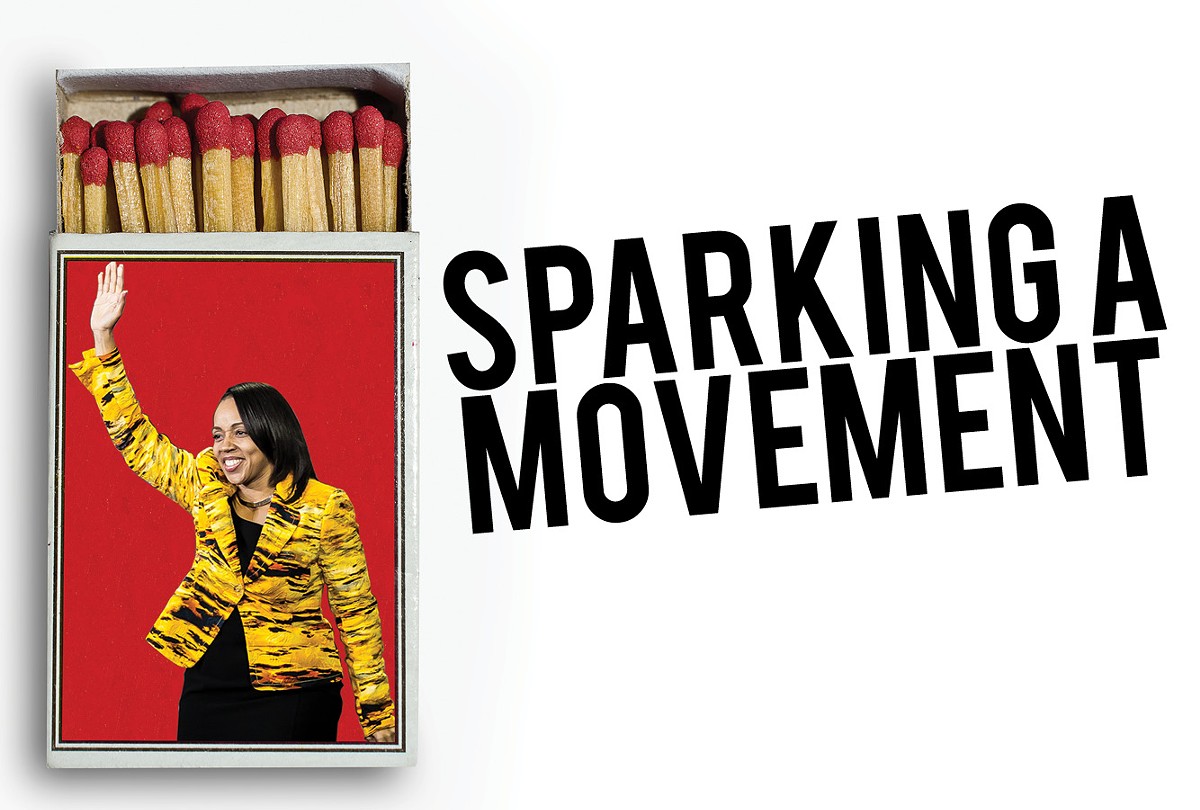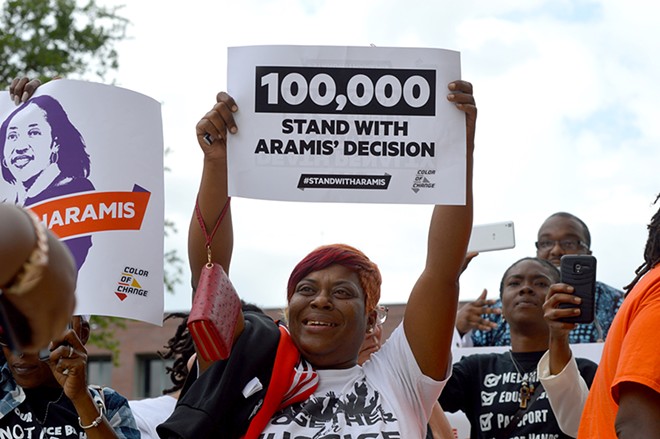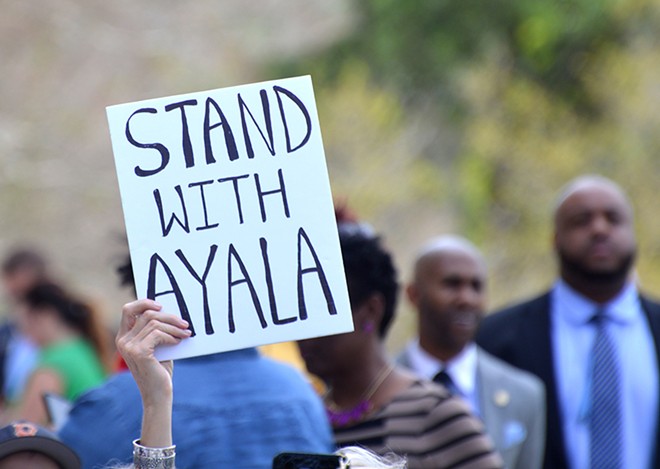Herman Lindsey can tell you what it's like to wait for a turn with death.
After being sentenced to die in 2006, he was put on Florida's death row in 2007, and sat caged inside a plain, box-like cell at the old, dusty state prison in Raiford, where winter and summer temperatures seemed harsher inside than out.
Lindsey was convicted of the murder of a store clerk who was fatally shot during a Fort Lauderdale robbery in 1994. He didn't get to say goodbye to his loved ones when he was sentenced to die, and it was hard for anyone to make the five-hour trek from Broward County to the isolated facility up north. As he fought to prove his innocence, other men were taken into the white execution room, strapped with leather bonds onto a gurney and injected with a fatal cocktail of drugs. Most went quickly and quietly, but at least one execution was painfully botched. As he waited alone, Lindsey begged God to let him go.
"One thing Florida cannot guarantee is that they will not kill an innocent person," he says in an interview. "The system is intact to protect us, to seek justice for victims, but in my case, they created a victim."
And then, one seemingly miraculous day – Tuesday, July 28, 2009 – Lindsey was free. After fighting his case all the way to the Florida Supreme Court, all seven justices agreed the evidence was insufficient to support his conviction, much less the death sentence he received from an 8-4 jury. Lindsey became the 23rd prisoner exonerated and freed from death row in Florida, which leads the nation for exonerees.
Under the shade of the state Capitol building last Thursday, Lindsey told a crowd he's been fighting to abolish the death penalty since he was released in 2009. Lawmakers have heard about his struggles to move past the trauma and live a normal existence – whenever he applies for a job or a place to live, the murder still shows in his background check, and he feels this has wrecked his life. Lindsey felt ignored – until last month.
In March, Orange-Osceola State Attorney Aramis Ayala put herself at the center of the death penalty debate, igniting a firestorm of criticism after she declared she wouldn't pursue an execution for murder suspect Markeith Loyd – or, for that matter, any other case during her tenure.
Hours after Ayala's announcement, she says she was asked by Florida Gov. Rick Scott in a 25-second phone call to recuse herself from the case. She refused and tried to explain the reasoning behind her conclusion – that the death penalty is costly, has no effect on public safety and does not deter crime – but Scott wouldn't listen. Before the end of the day, Scott used his executive authority to remove Ayala from the case and reassign it to another state attorney, saying it was "clear that she will not fight for justice." That move sparked further controversy and fueled a conversation Lindsey has been desperate to have.
"God was giving me the experience to be a voice," he said to the hundreds who traveled miles in buses and cars to support Ayala in Tallahassee. "This year, we actually are being heard. And what State Attorney Ayala is doing is helping us with our fight to end the death penalty."
Lindsey, 44, said he got no apology or compensation from the state after being wrongly imprisoned. Like a church on Sunday, the crowd seated on white plastic chairs listened with rapt attention to Lindsey's sermon, shouting every so often, "Amen!" They'd come from Jacksonville, Orlando and Miami to air their grievances in our lawmakers' playground.
"I done been to that governor's office. He won't even see me. But he says he wants somebody there for justice," Lindsey exclaimed to them, pointing toward the Capitol. "What would have happened if I would have died there?"
There's no question Ayala has ignited the discourse around capital punishment in Florida, but abolishing it completely is more complicated. The state's sentencing law has been used to execute hundreds of people since 1924, and despite its having been declared unconstitutional several times, lawmakers and governors have chosen to work out the kinks as they come. Still, some say the embattled prosecutor's decision is a sign that Florida's days of legalized killing are numbered. For civil rights attorney Natalie Jackson, the movement sparked by the "darling of progressives" could end the death penalty not only in Florida, but the rest of the country.
"I think she believes in justice and she believes in doing the right thing," Jackson says. "I don't think she's going to waver from it. The death penalty has been on its way out for the past 20 years. Aramis might have just dealt it the death blow."
"A little more bloodthirsty."
The death penalty scheme in Florida has been on wobbly footing for some time, since well before Ayala's decision.
The last blow against it came in a surprisingly scathing dissent from Florida Supreme Court Justice James E.C. Perry before his retirement last December. The state court was listening to an appeal from Mark James Asay, a white supremacist whose lawyers argued he shouldn't be on death row because his sentence was unconstitutional under the guidelines set in the 2016 case Hurst v. Florida.
The U.S. Supreme Court found in Hurst that Florida's sentencing scheme was unconstitutional because it allowed judges, instead of juries, to find the aggravating circumstances and ultimately impose the death penalty. State lawmakers tried to fix the problem last year by requiring juries to find those factors, and by requiring 10 out of 12 jurors to recommend a death sentence, instead of a simple majority. The Florida Supreme Court struck down that revision as well, saying a jury had to be unanimous on capital punishment, a decision that could require the resentencing of hundreds of inmates on death row.
Asay, who was convicted of randomly shooting one black man to death and then murdering a black transgender woman who was a sex worker on one night in 1987, was denied a resentencing by the majority of Florida justices because his case came before the 2002 U.S. Supreme Court ruling that Hurst was based on. In his dissent, Perry noted Asay would be the first person executed in Florida for killing a black person. A study on Florida executions by the University of North Carolina at Chapel Hill found both black and white convicts were more likely to face the death penalty for killing white victims, despite these victims figuring in just a little more than half of all homicide cases.
"It does not escape me that Mark Asay is a terrible bigot whose hate crimes are some of the most deplorable this state has seen in recent history," Perry wrote. "However, it is my sworn duty to uphold the Constitution of this state and of these United States and not to ensure retribution against those whose crimes I find personally offensive."
Perry said the "arbitrary" ruling was unconstitutional because it created two groups of similarly situated people. If, for example, Asay had committed his crimes in 2002, his case would be eligible.
"As my retirement approaches, I feel compelled to follow other justices who, in the twilight of their judicial careers, determined to no longer 'tinker with the machinery of death,'" Perry wrote. "The majority's decision today leads me to declare that I no longer believe that there is a method of which the State can avail itself to impose the death penalty in a constitutional manner."
In an interview, Perry says most civilized nations have gotten rid of the death penalty, but Florida is a little more "bloodthirsty."
"It really is a matter of retribution as opposed to deterrence," he says. "I think the majority of Floridians are against the death penalty. Perhaps the legislators are afraid they're going to be thought of as soft on crime, but life in prison without the possibility of parole is not a cupcake walk. Plus, there's the money saved and the judiciary time and effort. These people who think they're fiscal conservatives could save up to $2 million for every person on death row."
In fact, 62 percent of Floridians support sentencing convicted murderers to life in prison with no possibility of parole or similar alternatives rather than the death penalty, according to a 2016 poll from Public Policy Polling.
Florida's bloodlust has led it to several botched executions since the death penalty was reinstated in 1976, as it fine-tunes its method of killing people. The latest one was in 2006, when Angel Nieves Diaz took 34 minutes to die after the lethal injection. An investigation later found executioners inserted the IV needles improperly into Diaz's flesh, so the drugs seeped into his skin and chemically burned his arms. When Florida's supply of one drug fell short, the state became the first in the country in 2013 to use midazolam hydrochloride, though critics argue it's debatable whether midazolam reliably renders inmates not conscious of the proceedings.
Pharmaceutical manufacturers have refused to sell their drugs to states for the purpose of death, so the state is now low on supplies of midazolam and potassium chloride, another drug used in the three-drug execution cocktail. Florida is now proposing a new drug cocktail using etomidate (a sedative that has never been used in an execution) and potassium acetate (a drug to make the heart stop beating that was accidentally used in a botched execution in Ohio). Records show the state has been stockpiling etomidate since 2016.
Robert Dunham, executive director of the Death Penalty Information Center, says there was no guarantee with Florida's old lethal cocktail that prisoners weren't experiencing pain, which would violate the U.S. Constitution's ban on cruel and unusual punishment: "The drugs may inhibit any physical response, but a person could be perfectly conscious and paralyzed while feeling they're burning to death."
Dunham also agrees that the death penalty has not been proven to stop people from committing horrific murders.
"There's no relationship between the death penalty and murder rates going up or down," he says. "The death penalty is inextricably linked to the legacy of slavery and lynching, and it has been used historically to reinforce a particular social order. When a prosecutor threatens that social order by validating the views of critics of the death penalty, that provokes a strong response, and the response is even stronger because the prosecutor here is black and the governor is white."
"An eye for an eye."
Ayala chose to threaten the social order with Markeith Loyd, who is allegedly about as perfect a candidate for capital punishment as they come.
Loyd, 41, is accused of fatally shooting his pregnant ex-girlfriend Sade Dixon last December. After being on the run for a month, Loyd was stopped by Orlando Police Lt. Debra Clayton at a Walmart on Princeton Street after witnesses alerted her. After an exchange of gunfire where Clayton was hit, police say Loyd returned to shoot her in an "execution-style" manner before escaping.
After the shooting of Clayton, authorities across the region launched a massive manhunt to find him. Police found Loyd hiding in an abandoned home a week later, and aerial video of the arrest appeared to show Loyd crawling to officers to turn himself in. As officers appeared to begin kicking the prone Loyd, the camera panned away from the action to a stand of unmoving trees.
Loyd was taken to the Orange County jail with a bloodied face, and has since represented himself in court. Orlando Police Chief John Mina got wind early that prosecutors wouldn't be charging Loyd with the death penalty and said he was "extremely upset."
"Debra was given no chance to live," Mina said in statement. "A cop killer – who also killed his pregnant girlfriend – should not be given that chance."
When Ayala announced her decision, she didn't base it on any of the particulars of Loyd's case. After careful consideration, she says the death penalty doesn't have a public safety benefit, doesn't deter crime, and drags victims' families through the justice system as defendants continue to appeal their case.
"What has become abundantly clear through this process is that while I currently do have discretion to pursue death sentences, I have determined that doing so is not in the best interests of this community or in the best interests of justice," Ayala told reporters on March 16. "There is no justice when victims are being misled about an end that I doubt will occur."
Some victims' families were outraged with Ayala's decision, like Rafael Zaldivar, whose son Alex Zaldivar was killed in 2012. His son's convicted murderer, Bessman Okafor, was sentenced to death, but his case is currently before the court because the jury's verdict was not unanimous. Zaldivar doesn't trust Ayala with his son's case, saying, "She should resign, and somebody else should take her place right now." (And in fact, at press time on Monday, April 3, Scott reassigned 21 other first-degree murder cases away from Ayala, including Okafor's.)
Jeff Ashton, the former Orange-Osceola state attorney who lost to Ayala in the Democratic primary, said in a commentary piece in the Orlando Sentinel that had Ayala simply charged Loyd with something else, he would defend her right to do so. But he says Ayala is overreaching in the interpretation of her use of discretion.
"Instead of following the dictates of the statute and exercising appropriate discretion in that evaluation, she has unilaterally decided to throw out the entire system," Ashton wrote. "Progressives applaud this decision as brave because they like the outcome. I ask them to imagine the chaos if every prosecutor were to decide to pick and choose those laws to follow and those to ignore. Perhaps the next law to be ignored would be one you would miss. Adherence to the statute is mandatory, morons."
Miles Mulrain Jr. says his friend Sade Dixon was a sweet, lovable mother of two. He is upset by her murder, but agrees with Dixon's mother, Stephanie Dixon-Daniels, who just wants closure in the death of her daughter.
"I would love for him to die right now, but that's not going to happen," Dixon-Daniels said at rally supporting Ayala. "He will die in prison. An eye for an eye. A tooth for a tooth. Thou shall not commit murder. ... I also want him to pay for his hideous crimes of killing my daughter's and his unborn child."
Mulrain, a local organizer in Orlando, says the community elected Ayala and trusts her judgment.
"I'm not a fan of the death penalty, but to be honest, I feel like it's something that can go either way," he says. "It's not black and white. But I do believe in change, and I do believe for that last 80 years, our system has been messed up. I trust State Attorney Ayala to try to get a different result."
"You can't just do what you want to do."
The crowd was already quieting down under the hot sun when T.J. Legacy-Cole got to the podium, but he wasn't having it.
After all, Legacy-Cole and the activists coming from Orlando had gotten up early, boarding a charter bus single-file around 6:30 a.m. for a four-hour trip to Tallahassee. More than any other group that gathered outside the Florida Capitol last week, they had the most stakes in the game. Like Loyd, Dixon and Clayton, they mostly live in the black communities on the west side of Orlando that includes Pine Hills, Ocoee and Apopka. Last November, they overwhelmingly elected Ayala in huge majorities.
After the governor removed Ayala from the Loyd case, conservative lawmakers, including House Speaker Richard Corcoran, asked him to go further and suspend her. A Seminole County Clerk's Office employee resigned after being suspended for saying on Facebook Ayala should be "tarred and feathered if not hung from a tree." And Republican legislators proposed cutting the Ninth District State Attorney's Office budget by almost $1.3 million and 21 positions, a tactic seemingly meant to punish Ayala for not wanting to pursue the death penalty.
Meanwhile, Ayala's critics have pounced on her for not disclosing to voters before her 2016 election that she opposed the death penalty. Legacy-Cole, who supported Ayala during the primary, says she wasn't given much of a chance to air concerns she had with the statute because her incumbent opponent Jeff Ashton would not debate her.
So when Legacy-Cole got on the podium, the organizer brought all the people from his bus with him so the crowd could see them. They clamored past hundreds in chairs to get to the front and raise their fists toward the sky.
"We voted for State Attorney Aramis Ayala and we stand by her!" he shouted into the mic. "Not to give her a blank check, because we believe in holding all elected officials accountable. But when you are an elected official and we go to the polls, we demonstrate our power. And when you, as the governor decide to take the power away from the people, we will not stand for that!"
The debate sparked by Ayala's decision questions how far lawmakers are willing to give in to the demand for Loyd's death. In a letter, more than 100 legal experts from around the U.S. say Scott's decision to remove Ayala from the Loyd case and replace her with Ocala-based State Attorney Brad King is a "dangerous precedent."
"The governor picking and choosing how criminal cases are prosecuted, charged or handled in local matters is troubling as a matter of policy and practice," the letter says. "Indeed, there appears to be no precedent in Florida for this type of use of power."
Scott Sundby, a law professor specializing in death penalty and criminal law at the University of Miami, says the authority Scott used to remove Ayala for "good and sufficient" cause is usually meant for conflict of interest cases, not instances where they have differing policy judgments.
"It's absolutely not justified," Sundby says. "The governor's office seems to be disenfranchising local voters. We could have a system where the governor appointed prosecutors, but in this instance he's trying to take a shortcut rather than go through the legal process of amending the constitution. If anyone would be operating outside the law, it's the governor's office."
Sundby adds that people should be concerned about the departure from constitutional norms, regardless of the case. "There is an electoral process, and we don't want empirical dictates coming from Tallahassee that bypass the democratic process – that's anti-American," he says.






















